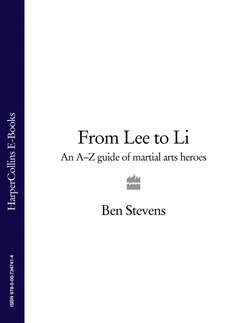Читать книгу From Lee to Li: An A–Z guide of martial arts heroes - Ben Stevens - Страница 20
CHEUNG, KU YU
ОглавлениеOld, black-and-white photographs abound of Grandmaster Ku Yu Cheung bending a steel bar around his arm, having a large boulder placed on his stomach, being smashed over the head with a lump of quarry stone, breaking twelve bricks with the palm of his hand, and so on.
Certainly, early on in his life, nothing indicated that Cheung would one day be capable of performing such feats. This was in spite of the fact that his father was a famous martial artist, who acted as an ‘escort’ to wealthy merchants who would otherwise be plagued by robbers and other assorted ne’er-do-wells as they travelled throughout China on business. So successful was Cheung’s father that he established a business employing some 200 martial arts’ experts, all acting as escorts or bodyguards for those who could afford their services. Through this, Cheung’s father could afford to send his quiet, bookish son to an exclusive private school.
Only on his deathbed did his father apparently plead with Ku Yu to train in the martial arts, and so off went the teenager to a kung-fu master named Yim Kai Wun.
In the ensuing eleven years, Cheung learned—amongst many other things—leg techniques, breath control and Gum Jung Chi Gung or ‘iron shirt’—the art of making the body withstand any blow.
The news that his mother had passed away caused Cheung to finally leave his sifu, or ‘teacher’, and return home. As he did so, Yim Kai Wun gave his departing student one last piece of advice:
‘Through your kung-fu training you have succeeded in climbing one mountain, but just remember—there is always another.’
Later, sometime around the mid-1920s, Cheung was appointed bodyguard to the Secretary of Finance, and then became Chief Instructor in the Martial Arts to the military. One of his ‘party tricks’ was to have a car filled with three students driven over his shirtless body.
A story concerning Cheung details how he accepted a bet that he wouldn’t be able to withstand a kick from a horse. Proving that he in fact could, he then insisted that he be allowed to hit the horse back—something which caused the unfortunate creature to expire soon after. (Outwardly, the horse bore hardly any trace of having received a blow. When an ‘autopsy’—of sorts—was performed, however, it was discovered that most of its internal organs had been ruptured. Such was the lethal power of Cheung’s ‘iron hand’.)
